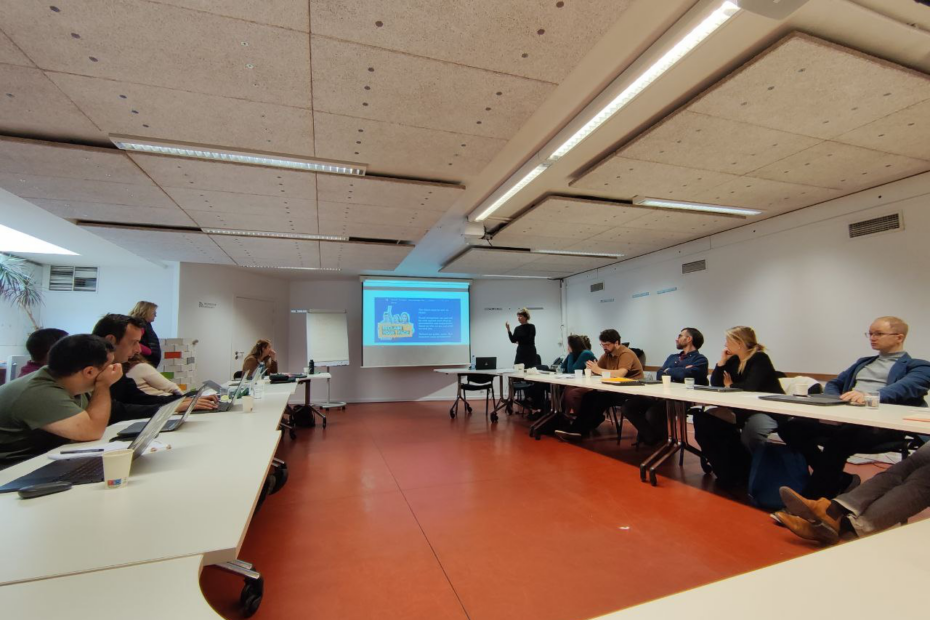The first Big Fat Brussels Meeting, held in 2013, established a tradition for Wikimedians to congregate in Brussels for a two-day gathering on advocacy and policy issues. Last month, the ninth edition of the meeting took place, bringing together almost forty Wikimedia volunteers and staff.
The basic goal was to prepare for the challenges in the legislative landscape that we expect in Europe, regardless of whether at the EU, national, or Council of Europe level. We discussed Issues that would affect our projects, like “How to protect children online without gathering user data?” and “Will artificial intelligence (AI) change the way copyright works?”
Additionally, participants had the opportunity to attend training sessions, which extended over topics as different as “How to carry out value-based communication” to “How to map relevant decision makers” to “How to draft an advocacy email.”
New Political Environment
Participants also had an exchange on the new political configuration that resulted from the European Parliament elections this past June 2024. Our discussion highlighted that two new far-and-further-right political groups have been formed in the parliament, and that the overall majority has drifted to the right.
At the same time, participants looked at the new structure of the European Commission, which reflects the strengthened political power of President Ursula von der Leyen, and considered the most relevant Commissioners-Designate. Concerning our issues, the title of the latter certainly goes to Henna Virkkunen, the “Executive Vice-President for Tech Sovereignty, Security and Democracy.”
If confirmed by the parliament, Virkkunen will be the main figure dealing with digital issues, including the Digital Services Act (DSA) implementation, copyright, and artificial intelligence (AI), and will oversee DG Connect (fully, the Directorate-General for Communications Networks, Content and Technology), where the European Commission units dealing with content moderation, copyright, and AI are located.
New and Old Legislative Reforms
Among future legislative reforms and topics we can note the implementation of the DSA, the transposition (that is, the process where EU member states give force to EU directives by implementing them as national laws) of the so-called anti-SLAPP (Strategic Lawsuits Against Public Participation) Directive, the implementation of the EU Artificial Intelligence Act (which covers the issue of attribution and copyright) as well as the possible new AI Liability Directive, the Digital Knowledge Act for Europe, and the two very topical issues of geo-blocking and child protection — the latter including age verification systems.
Age verification is a very sensitive subject, since the protection of children online is hotly debated across Europe and the rest of the globe. From a Wikimedia perspective, we want to make sure children are solidly protected both on and off the Wikimedia projects and the internet as a whole, but we worry that some proposals require collecting additional personal data to do so, which runs counter to the data minimization practices on the projects that make both readers and volunteers safer. As a result, this is a challenging political and legislative conversation for which we must be prepared.
Researching Elections Information on Wikipedia
This year there was a third bonus day, which we spent inside the European Parliament. We kicked it off with a roundtable that presented a project to research how information and disinformation fares across different language versions of Wikipedia. The project, where Wikimedia Europe has partnered with European research teams, shall offer policy recommendations based on its learnings.
The roundtable was followed by a meeting with experienced European Parliament staffers, who shared their views on the new parliament’s configuration and the most significant dossiers for the next term. They also provided recommendations and tips on how to carry out lobby activities directed at Members of the European Parliament (MEPs).
Do You Want to Learn More?
If you would like to follow the public policy advocacy work of Wikimedia and Wikimedians across the world, you may sign up to the Wikimedia public policy mailing list and say “Hi!”. If you would like to get involved in this work within Europe or simply have a question, please don’t hesitate to drop us a line at advocacy@wikimedia-europe.eu.









